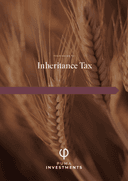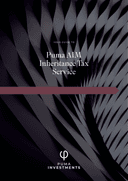Inheritance Tax Solutions
Business Relief (BR) ─ previously known as Business Property Relief (BPR) ─ qualifying investments are an important estate planning option to consider when looking to mitigate the potential impact of Inheritance Tax (IHT) from an estate.
Introduction
Most people want to leave as much as possible to their loved ones on their death. The last few years have seen a significant rise in the value of people's property and assets, but the threshold at which IHT is payable hasn’t changed – so the amount collected in IHT has increased, and according to the Office for Budget Responsibility (OBR), the number of estates on which IHT is payable will reach 50,000 annually by 2026 – up from 22,000 in 2018/19.
BR is a tax relief that is offered on unlisted companies, including companies quoted on AIM and small family businesses that are private trading companies. In general, as long as the company that the shares are being held in is a trading company, they can attract Business Relief – however, certain qualifying restrictions apply. This means that if your client has owned these shares for at least two years upon death, no IHT is due on those shares.
Tax reliefs associated with Business Relief
Business Relief can provide up to 100% relief on IHT on the value of the business or its assets, provided certain conditions are met:
- The investor must have owned the business assets or shares for at least two years at the time of their death.
- The business must not be subject to a binding contract for sale at the time of the investor's death.
- The company must be a qualifying company, as described below.
It's important to note that while Business Relief can significantly reduce inheritance tax, it doesn't provide relief from other forms of taxation like income tax or capital gains tax.
The Office for Budget Responsibility has estimated that the amount of IHT collected will rise from:
in 2020-21 to
by 2027-28
of national income in 2027-28
OBR: Inheritance Tax, updated 21 April 2023.
Ways to invest
There are two main routes to making Business Relief qualifying investments:
Direct Investment: Investors can directly buy shares or assets in a qualifying business. This approach requires a deep understanding of the business, industry, and overall market conditions to minimise risk.
Managed investment schemes and discretionary portfolio services: Fund managers provide access to portfolios of companies that seek to qualify for Business Relief. Such services offer the opportunity to diversify risk and ensure professional oversight of investors' capital.
Types of companies that qualify for Business Relief
To qualify for Business Relief, companies must be trading companies, not investment companies, meaning that more than 50% of activity is trading as opposed to investment activity.
In addition, the company cannot be listed on a recognised investment exchange. However, companies quoted on the Alternative Investment Market (AIM) may qualify for Business Relief if they are trading.
Key benefits of a Business Relief investment
Investing in Business Relief qualifying investments attracts a number of benefits, namely:
Inheritance Tax Planning: Business Relief is a crucial tool in estate planning. By investing in qualifying businesses, you can reduce the inheritance tax liability on your estate.
Supporting Smaller Businesses: By investing in Business Relief qualifying companies, investors can support smaller or riskier businesses that might otherwise struggle to raise capital. This can help drive innovation and economic growth.
However, please note that tax rules may change, which could affect the reliefs available for IHT purposes. Tax reliefs are subject to individual circumstances, and independent tax advice should be taken. While the Tax Adviser will also carry out an annual review of the portfolio, we can’t guarantee that all portfolio investments will qualify for BR. If a company should be non-qualifying when selected for the portfolio or become non-qualifying thereafter, then any applicable BR could be reduced accordingly.
Open BR-qualifying offers from Puma Investments
Puma AIM ISA Inheritance Tax Service
£194.4m
Portfolio assets under management
90%
Companies in the portfolio with a market cap above £100m
OPEN FOR NEW INVESTMENT
Tax-efficient growth with IHT relief, in an ISA
The Puma AIM ISA Inheritance Tax (IHT) service seeks to offer investors the potential growth opportunities of a carefully selected portfolio of AIM stocks combined in a tax-efficient ISA wrapper with the additional benefits of IHT relief gained from utilising Business Relief.
Read morePuma Heritage Estate Planning Service
0%
Capital losses to date
88/100
Tax Efficient Review
December 2023
OPEN FOR NEW INVESTMENT
Tax-efficient inheritance planning
The Puma Heritage Estate Planning Service invests in private trading companies, including Puma Heritage Ltd, which have a conservative trading strategy focused on secured lending.
Read morePuma AIM Inheritance Tax Service
£194.4m
Portfolio assets under management
90%
Companies in the portfolio have a market cap above £100m
OPEN FOR NEW INVESTMENT
Long-term growth and IHT relief
The Puma AIM Inheritance Tax (IHT) service seeks to offer investors the potential growth opportunities of a carefully selected portfolio of AIM stocks combined with the benefits of IHT relief.
Read more
FAQs
Business Relief, previously known as Business Property Relief, is a tax relief mechanism in the UK designed to reduce the IHT liability on the value of a business or its assets.
Business Relief can provide up to 100% relief from IHT on business assets or shares, provided they have been held for at least two years and the point of death, provided they meet specific qualifying criteria.
Typically, unlisted trading companies qualify for Business Relief. Some listed companies may also qualify if the investor has shares controlling more than 50% of the voting rights. However, this will typically only attract 50% Business Relief. The business must be wholly or mainly a trading company (more than 50% of its activity involves trading, not investment). Please visit the Business Relief for Inheritance Tax page on the Gov.co.uk website for full, up-to-date details.
There are three main routes – direct investment in qualifying businesses, through an IHT-managed service or via an IHT fund, which invests in a range of qualifying businesses.
No, the company needs to meet certain criteria. It must be a trading company and not just an investment company. Additionally, the investor needs to hold on to the investment for a minimum of two years and at the point of death.
Investing for Business Relief can help reduce IHT liabilities, support small businesses, potentially deliver high returns, and add diversity to an investment portfolio.
Business Relief investments typically involve smaller and riskier companies, and these investments carry a higher degree of risk, including potential loss of capital. It's also important to note that the rules for Business Relief could change, impacting the potential IHT benefits.
No, Business Relief applies only to IHT. It does not provide relief from income tax or capital gains tax.
To claim Business Relief, the investment must have been held for at least two years and at the point of death.
Yes, if the nature of the business changes such that it no longer qualifies as a trading business, or if the business assets are sold or reduced, the relief can be lost.



